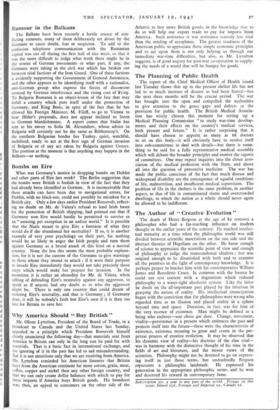Rumour in the Balkans
The Balkans have been recently a fertile source of con- flicting rumours, many of them deliberately set about by the Germans to cause doubt, fear or suspicion. To add to the confusion telephone communication with the Rumanian capital was cut off during the first half of this week, so that it was the more difficult to judge what truth there might be in the stories of German movements or what part, if any, the Germans were taking in the civil war which has broken out between rival factions of the Iron Guard. One of these factions is evidently supporting the Government of General Antonescu, and the other appears to be identifying itself with a nationalist, anti-German group who express the forces of discontent aroused by German interference and the rising cost of Vying. To Bulgaria Rumania is an object-lesson of the fate that may befall a country which puts itself under the protection of Germany, and King Boris, in spite of the fact that he has allowed his Foreign Minister, M. Filoff, to go to Vienna to hear Hitler's proposals, does not appear inclined to listen to German blandishments. A report comes that Stalin has sent as his envoy to Sofia M. Alexandrov, whose advice to Bulgaria will certainly not be the same as Ribbentrop's. On the southern Bulgarian border lies Turkey, quiet, watchful, mobilised, ready to act at the first sign of German invasion of Bulgaria or of any act taken by Bulgaria against Greece. The position at the moment is that anything may happen in the Balkans—or nothing.


























 Previous page
Previous page